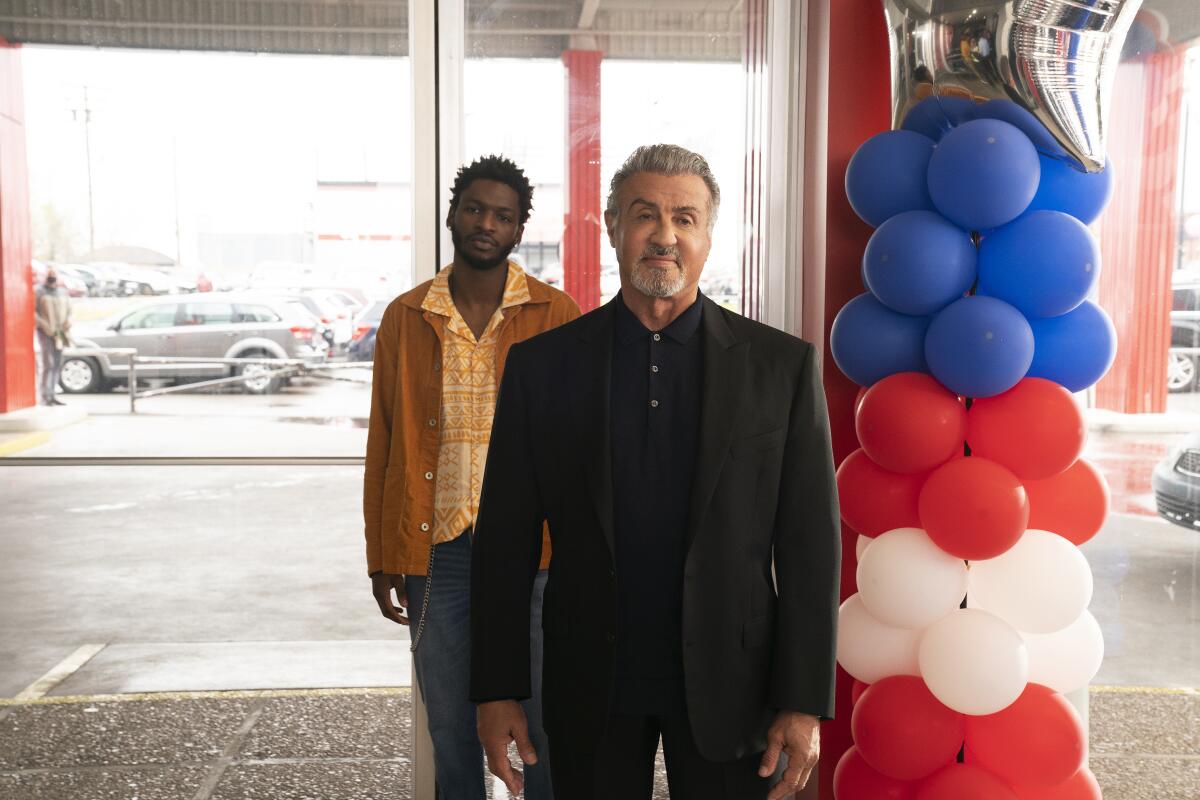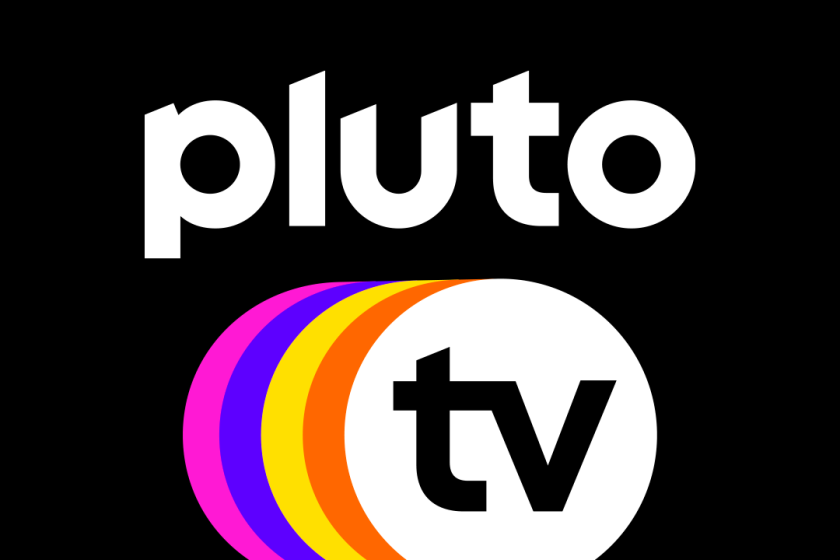Why your favorite streaming shows are showing up on traditional TV

- Share via
In the late 1990s, NBC ran a promotional campaign with the slogan, “If you haven’t seen it, it’s new to you,” aimed at boosting summer reruns of such hits as “Mad About You” and “Fraiser.”
Updated for 2024, the line would be, “If you haven’t streamed it, it’s new to you.”
Original series created to drive new subscribers to streaming platforms are showing up more frequently on linear broadcast and cable TV networks. Media companies are looking to expose the programs to broader audiences and fill out their lineups to help pay the freight as they battle to keep pace with Netflix.
This summer, CBS will be running the first season of the Taylor Sheridan crime drama “Tulsa King” starring Sylvester Stallone — a show that was made for streamer Paramount+. You can binge rival Peacock’s new reality series “The McBee Dynasty,” but if you want to kick it old school, individual episodes air weekly on parent company NBCUniversal’s USA Network.
In January, ABC aired the first season of the Hulu hit “Only Murders in the Building,” It performed well enough for the network to plan on airing another season at some point in the future.
The trend runs counter to the perception that viewers looking for non-sports entertainment programming have abandoned linear TV.
It may be true that many younger consumers who have grown up with streaming don’t even own a TV set, which they see as a gadget to bombard their parents and grandparents with pharmaceutical drug commercials all day. But for media companies, linear TV, while on the decline with shrinking ratings and cord-cutting, has turned into a marketing tool that expands public awareness of their streaming shows.
Meanwhile, the streaming businesses owned by legacy media companies such as NBCUniversal parent Comcast Corp., Paramount Global and Disney are all under pressure from Wall Street to generate profits. Turning to linear networks is a means of generating more revenue to help monetize their investments in streaming.
“These companies are hemorrhaging money [on streaming],” said Doug Herzog, a veteran cable and broadcast executive. “None of it is working great. That’s the issue. They are trying things out because that’s what they should be doing.”
Paramount Global Chief Financial Officer Naveen Chopra summed up the approach at an investor conference where he said his company aims to get “the most we possibly can out of every single dollar that we invest in content.”
Executives say viewers can expect to see more original programs created exclusively for streaming services pop up on broadcast and cable channels.

That’s because the broadcast networks have the ability to reach more than 95% of the homes in the U.S. While cord-cutting has reduced the number of homes getting pay TV, major cable networks are connected to about 70 million homes, still more than most subscriber-based streaming services. Peacock, for example, has about 30 million paying subscribers.
Streaming shows can become hits and cultural touchstones, but it’s harder for them to reach the kind of critical mass that big network TV series such as “Friends” once achieved. That’s why the legacy companies are finding that shows already exposed on streaming can pass as original programming on linear TV.
Free, ad-supported streaming TV services are growing fast and expected to command significantly more advertising dollars this year.
“It’s something we will continue to do because what you see in a fragmented marketplace — as popular as these shows are — there are still people who have not seen them,” said Craig Erwich, who as president of the Disney Television Group oversees ABC and Hulu. “Putting them in different places and telling people they are there is always additive. It’s never cannibalistic.”
With a cast that includes Martin Short, Steve Martin and Selena Gomez, “Only Murders in the Building” is a show with the kind of broad appeal linear TV networks still seek, requiring just a few edits of foul language.
Disney found that half of the viewers who watched “Only Murders” on ABC were not signed up to Hulu, which has almost 50 milllion subscribers. After the series aired on the broadcast network, viewers wanted more. The hours of viewing for the first two seasons of the program rose by 40% on its original streaming home.
“It was new to a lot of people,” Erwich noted. “It surprises me because the show is so wildly popular in both consumption and critical acclaim that you start to think that everybody who wants to see this has seen it. But it’s a big country and there are many different types of people who want to watch TV in many different types of ways.”
NBCUniversal similarly saw viewers flock to Peacock to watch the second season of the medical anthology drama “Dr. Death,” after episodes from Season 1 aired on NBC. Viewing of the show on Peacock rose 58%.
“Only Murders” came in handy for ABC, as last year’s strikes by Hollywood screenwriters and actors had shut down production for months and cut off the pipeline of fresh programming. But the network was looking for a way to deploy the show well before the labor stoppages became a factor, executives said.
Streaming shows are likely to show up on the networks during the summer months, when repeats can no longer draw a sizable crowd. Rather than investing in original series for a smaller available audience, CBS can turn to a streaming show with a high-profile star such as “Tulsa King,” which features Stallone as a crime boss.

This week, NBCUniversal’s Peacock unveiled a new serialized reality show, “The McBee Dynasty,” which tells the story of a family ranch and the four brothers vying to take over the business from their patriarch. The entire series is available to stream on Peacock while individual episodes air Monday nights after “WWE Raw” on USA Network.
Funneling the nearly 2 million WWE fans per week into the Peacock series uses one of the most time-honored stunts in the TV playbook.
The notion of a TV schedule where viewers are compelled to make an appointment to watch shows has almost become an anachronism in the age of streaming video on demand. But pulling an audience from one time period to the next remains the most efficient way to drive millions of viewers into sampling a new program, especially following live events or reality competition shows that are best enjoyed by watching in real time.
“The concept of a show-to-show audience flow is real,” said Frances Berwick, chairman of NBCUniversal Entertainment. “There is still a tremendous amount of value in it.”
NBCUniversal has been aggressive in using its linear channels to boost Peacock shows. “Bupkis,” the comedy series with Pete Davidson, has received several runs after “Saturday Night Live,” the show that made him a star. Episodes of Kevin Hart’s Peacock talk show “Hart to Heart,” have show up on the celebrity-focused cable network E!
Bravo aired the first season of the Peacock reality competition “Traitors” ahead of the streaming debut of its second batch. It was an easy fit, Berwick noted, as several of the players on the program come from the Bravo slate of reality shows such as “Below Deck.”
“We’ll do it where it makes sense and we have the right content,” Berwick said.
Most streaming shows making it to linear TV are staying under the same corporate umbrella. But it may be only a matter of time before networks regularly provide a second window for original shows created for platforms that they do not own. It’s already happening.
Fox recently cut a deal with Amazon’s Prime Video to get a broadcast run of the game show “The 1% Club” a week after episodes make their streaming debut. The CW is currently airing the Canadian sitcom “Children Ruin Everything,” which was created for the Roku Channel.
Similar deals and experiments are probably ahead in the effort to get programs in front of enough viewers to build them into profitable assets.
“We’re going to see a lot of creativity,” Berwick said. “Good content is good content.”
More to Read
Inside the business of entertainment
The Wide Shot brings you news, analysis and insights on everything from streaming wars to production — and what it all means for the future.
You may occasionally receive promotional content from the Los Angeles Times.












